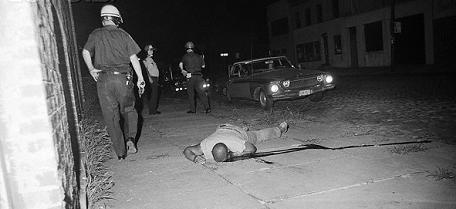The Boy Died in My Alley
Gwendolyn Brooks
to Running Boy

The Boy died in my alley
without my Having Known.
Policeman said, next morning,
"Apparently died Alone."
"You heard a shot?" Policeman said.
Shots I hear and Shots I hear.
I never see the Dead.
The Shot that killed him yes I heard
as I heard the Thousand shots before;
careening tinnily down the nights
across my years and arteries.
Policeman pounded on my door.
"Who is it?" "POLICE!" Policeman yelled.
"A Boy was dying in your alley.
A Boy is dead, and in your alley.
And have you known this Boy before?"
I have known this Boy before.
I have known this boy before, who ornaments my alley.
I never saw his face at all.
I never saw his futurefall.
But I have known this Boy.
I have always heard him deal with death.
I have always heard the shout, the volley.
I have closed my heart-ears late and early.
And I have killed him ever.
I joined the Wild and killed him
with knowledgeable unknowing.
I saw where he was going.
I saw him Crossed. And seeing,
I did not take him down.
He cried not only "Father!"
but "Mother!
Sister!
Brother."
The cry climbed up the alley.
It went up to the wind.
It hung upon the heaven
for a long
stretch-strain of Moment.
The red floor of my alley
is a special speech to me.
Brooks' The Boy Died in My Alley The theme of Gwendolyn Brooks' "The Boy Died in My Alley" dramatizes the conundrum of individual responsibility in confronting evil, while obviously leaving it unresolved. Gwendolyn Brooks’ “The Boy Died in My Alley” features nine stanzas. It includes dialogue, and its unusual capitalizations signal emphasis on certain words that the poet intends to carry more weight than the surrounding text. First Stanza: “The Boy died in my alley“ The speaker asserts that “the Boy” died in her alley. She capitalized “Boy” to give him more presence, although she does not know his name. To her, he is not just any boy, now especially after he has died. The speaker explains that she really did not even know that this boy had died. And the police reported to her the next morning that he “Apparently died Alone.” The speaker emphasizes depth of sorrow by capitalizing “Alone.” Second Stanza: “You heard a shot?" Policeman said” The policeman asks the speaker if she heard a shot, and she replies that she hears shots all the time, but she never sees the targets of the shot. Again, she emphasizes certain terms by capitalizing them. Third Stanza: “The Shot that killed him yes I heard” The speaker then confirms to the police that she no doubt heard the shot that killed “the Boy,” just as she has heard “the Thousand shots before.” For years, the speaker has heard gunshots in her alley; she describes their sound as, “careening tinnily down the nights / across my years and arteries.” Fourth Stanza: “Policeman pounded on my door” The speaker goes back in time a bit and says that the police “pounded on my door.” After she asks, “Who is it?” They respond, “POLICE!” Clearly, the speaker is used to this occurrence. When the police arrive, they always want to know if she heard the shot and if she were acquainted with victim, so they ask, “ . . . have you known this Boy before?" Fifth Stanza: “I have known this Boy before” The speaker then moves into a philosophical musing about her knowledge of the victims of gunshots in her alley: First she claims she has known “this Boy” before, signaling that yes indeed this particular boy she has known; although she does not know him personally, he is the latest victim and therefore is signaled by the capitalized “Boy.” Then she claims, “I have known this boy before,” signaling all of the other victims she has heard die. Still, she has never seen their faces, nor did she see the face of this Boy who died. When she sees the boys in her neighborhood, she knows they are potential victims of the gunshots she hears so often. Sixth Stanza: “I have always heard him deal with death” The speaker continues to nurse her guilt at hearing all those shots and not doing anything to stop them. She then makes the startling statement that because she has “closed [her] heart-ears late and early,” she has “killed him ever.” Seventh Stanza: “I joined the Wild and killed him” The speaker continues thinking about her unintended complicity in the murders of these boys; she calls her position a “knowledgeable unknowing.” She knew “where he was going” and although she “did not take him down,” she feels guilty. Eighth and Ninth Stanzas: “He cried not only ‘Father!’” The speaker senses that the young victims all cry out to their loved-ones. The cry vanishes into “heaven / for a long / stretch-strain of Moment.” Such knowledge she can now dramatize as a kind of unknowing, an acceptance of a status quo that she feels is too immense for her to confront. The final two lines, “The red floor of my alley / is a special speech to me,” offer an esoteric and pathetic claim that hangs as limp as the unsubstantiated guilt that befuddles the speaker’s thought processes. ~~~ The copyright of the article Brooks' The Boy Died in My Alley in American Poetry is owned by Linda Sue Grimes. Permission to republish Brooks' The Boy Died in My Alley in print or online must be granted by the author in writing. |
Source:
http://american-poetry.suite101.com/article.cfm/brooks_the_boy_died_in_my_alley
http://www.writing.upenn.edu/~afilreis/88v/brooks.html
Illustration:
http://www.corbisimages.com/images/BE020697.jpg?size=67&uid=A3B953DD-E01A-4D2E-BF6B-988EB694F5DE dramatizes the conundrum of individual responsibility in confronting evil, while obviously leaving it unresolved.
